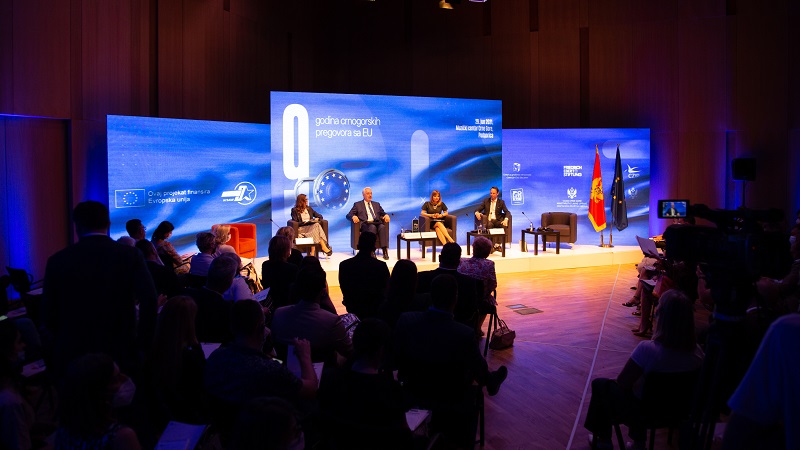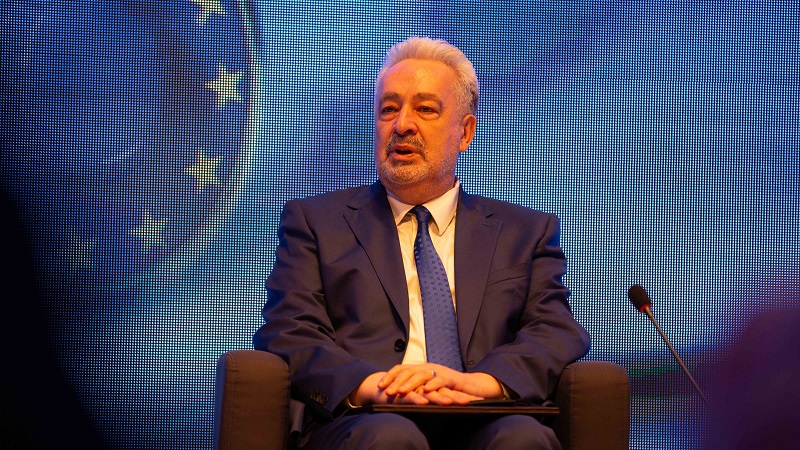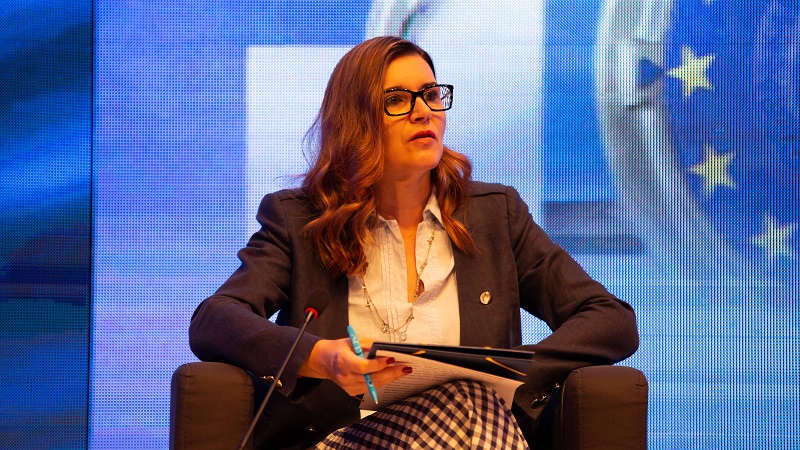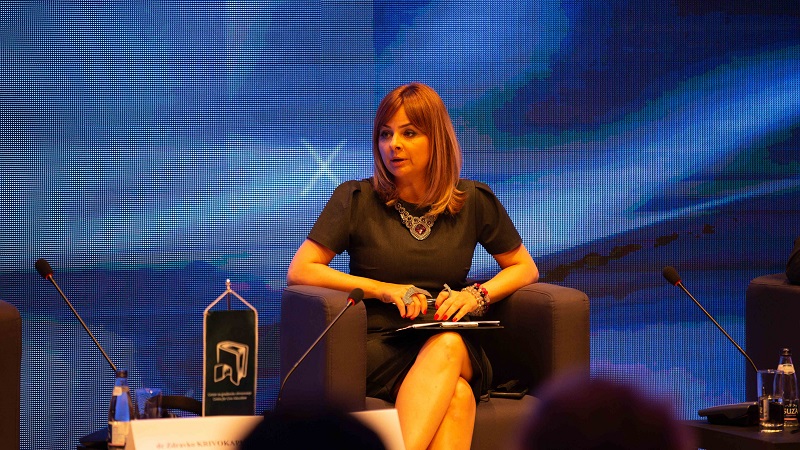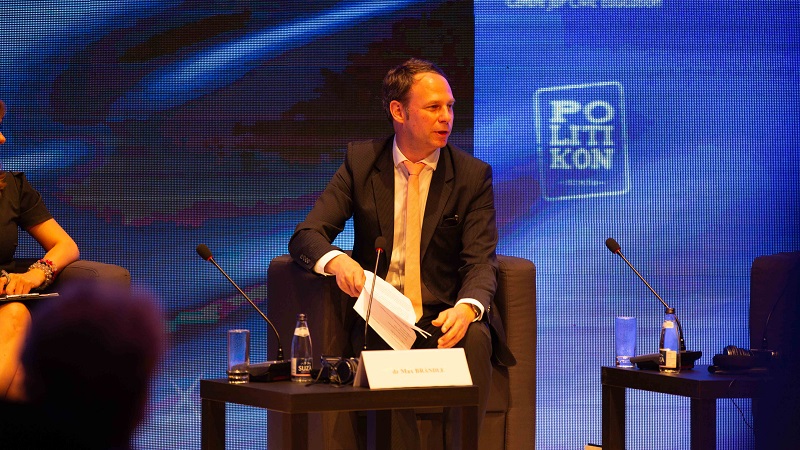Nowadays, the European idea is the only one that has a constructive potential to integrate the largest number of citizens in Montenegro and to make society as a whole more cohesive, and if everyone contributes, the country’s entry into the European Union (EU) in 2024 is possible. This was stated within the introductory remarks during the conference “Nine years of Montenegrin negotiations with the EU“, organized by the Centre for Civic Education (CCE).
The Prime Minister, Zdravko Krivokapić, assessed that the nine-year period was the time during which we should have been a satisfied EU member state, but this did not happen.
“I hope that we will understand the message from the recent Intergovernmental Conference in Luxembourg, where member states expressed positive intentions in supporting Montenegro to be the next member of the EU”, said Krivokapić, stating that this is the only chance for Montenegro to be different, more organized and provide the highest quality of life of citizens.
He assessed that Montenegro could join the EU in 2024, but “only if we all roll up our sleeves and realize that this is the only way in which everyone gives contributes.”
“Neither the Government nor the Parliament nor the judiciary can achieve that independently. It is an obligation of all of us. If we all perceive it that way, and I believe in the support we got in all forms, and that we will get in the coming period, it is a chance that we must not miss. It does not matter who will be the Prime Minister, the only thing that matters is that we truly take that path”, Krivokapić pointed out.
He reminded that Montenegro currently does not have a functional Mission to the EU, nor the Headperson to present visible results in Brussels.
“It is a common deficiency. And no one can justify themselves by declaring whether to like or dislike someone. We need to have the person in that Mission as soon as possible, the person who is qualified, competent, politically liberated, and willing to present Montenegro in Brussels in the best manner”, stated Krivokapić.
He said that “Montenegro must primarily be civic, democratic, European, but it has not yet become all that. It cannot become civic, nor democratic nor European if it does not achieve economic prosperity.”
Krivokapić announced that the Ministry of Justice, Human and Minority Rights will have two new state secretaries, one of whom will be head of the Working Group for Chapter 23, noting that it will contribute to overcoming current weaknesses.
The Head of the Delegation of the European Union to Montenegro, Oana-Cristina Popa, said that the rule of law has a fundamental role in the revised enlargement methodology, emphasizing that overall progress in the accession negotiations, the fulfilment of the rule of law interim benchmarks set under chapters 23 and 24 is crucial.
“Progress in the rule of law underpins all other efforts to improve citizens’ lives and ensure economic growth. The European Commission’s annual report presented last October and the non-paper on the rule of law of May 2021 offers good and detailed guidance for the way forward with these two chapters. As it is noted in the non-paper, Montenegro continued with the implementation of the action plans for rule of law chapters 23 and 24 and made efforts towards addressing the outstanding challenges, including in the critical areas of freedom of expression and fight against corruption and organised crime”, stated Popa.
At the same time, Montenegro’s fulfilment of the interim benchmarks does not depend only on the implementation of the respective action plans and strategic documents.
“It also entails a demonstration of strong political will at the level of government to address the remaining challenges; it requires the ability at the level of Parliament to establish a dialogue to unblock the pending appointments in the judiciary; and it cannot be done without a renewed commitment of the judiciary and prosecution to full implementation of EU accession related reforms”, said Popa.
According to her, the citizens of Montenegro have clearly and loudly said that the European future of the country is a question of utmost national interest that goes beyond all partisan divisions.
“The months ahead must be used to deepen and speed up political and economic reforms, so that Montenegro can earn its rightful place in the EU. Accession to the EU is not a box to be ticked, it is a process of internal transformation, which should bring concrete advantages to citizens already now. Let us make it happen”, stated Popa.
The Executive Director of the CCE, Daliborka Uljarević, believes that citizens increasingly stand out as a bright spot of the European integration process.
“Despite everything, they do not lose hope that the EU accession process will bring us in order, and therefore give continuous support to this process. Our public opinion researches also indicate that our citizens are maturing faster than those who should lead them, which is another Montenegrin paradox”, stated Uljarević.
She reflected upon two previous conferences that were organized on the occasion of the five and later seven years of negotiations, recalling that the slowdown had begun even then, but also pointed out that now the process has practically stopped. “That’s why we got the so-called new methodology, which should be perceived as a new chance given to bad students to try to regain the trust of professors and to demonstrate that they understand that the time of cheating has passed when taking exams”, she explained, emphasizing that the majority of decision-makers continue to “recklessly and underestimating address this process of the greatest social and state importance.”
“The previous government paid for its mistakes and ignorant attitude towards critical arguments in the elections. I do not know if the new government learned a lesson from that, but I know that national-clerical narrative and practices are incompatible with the Europeanization and democratization of society, accompanied by attempts at both historical and legal relativization of facts, which are often promoted by the current ruling majority and its representatives within various branches of government. If this continues, we will remain in a vicious provincial circle, nullifying even those small shifts made in internal reform efforts and limiting all future ones, putting into question the good foreign policy priorities of the state of Montenegro, but also jeopardising the fragile civic being in Montenegro”, said Uljarević about the current affairs.
She assessed that now is the time “for the new beginning, change of the existing paradigm and establishment of dialogue and consensus on European affairs or, more simply, our commitments in democratization of society, strengthening of institutions and the state of Montenegro”.
“This requires discontinuity from old and outdated practices of pulling politics out of dug trenches and demonstrating openness to an argument-based exchange of opinions, compromising with respect to principles, and overcoming this dangerous polarization that can easily overwhelm its creators with plenty of accompanying collateral damage. Nowadays, the European idea is the only one that has a constructive potential to integrate the largest number of citizens in Montenegro and to make society as a whole more cohesive”, underlined Uljarević.
Uljarević stated that it is time for the state to finally fulfil the benchmark that goes ahead of all Brussels’ ones – Montenegrin benchmark, “which I mentioned for the first time at our last conference two years ago.”
“That benchmark means that we, who are sincerely committed to Montenegro, set the goal of gathering around fundamental values and key issues and to work on consolidating the democratic order through a quality dialogue on Europe and Montenegro. This dialogue should remind us that caring for the state does not mean waving the flags of one’s own or another state, insisting on one’s religious or party affiliation, but acting responsibly, with personal engagement in the public interest and respect for the law, which applies to both the most responsible holders of power and the citizens of Montenegro. Only such an approach leads us towards strengthening the rule of law, political pluralism, the economy and stabilization of the state”, Uljarević said.
“This ninth anniversary may be an opportunity, as well as a new methodology, to take a path that will lead us out of a labyrinth in which no one is good in the long run, despite the delusive belief that short-term victories bring some stability. I hope that we will be wise enough to use this opportunity and revitalize the negotiation process, making it more functional and inclusive, with fewer promises and more achievements,” Uljarevic concluded.
Director of the Friedrich-Ebert-Stiftung Office in Belgrade (FES), Max Brändle, said that the polarization of society, problems in the rule of law, freedom of expression, fight against corruption and nepotism, climate change, COVID-19 pandemic, are challenges facing all citizens of Europe.
“Montenegro is not alone in this fight against these problems. I believe that EU accession provides a framework for solving these problems in a coordinated way”, Brändle said.
He considers that the moment when Montenegro joins the EU will not be the end of the path of Montenegrin democratization, the fight against corruption or challenges regarding freedom of expression, because these are processes that require constant and adequate addressing.
The conference is held within the project “CSOs in Montenegro – from basic services to policy making – M’BASE”, implemented by the CCE in partnership with German Friedrich Ebert Stiftung (FES), NGO Politikon and NGO Center for Protection and Study of Birds (CZIP), in cooperation with the Ministry of Public Administration, Digital Society and Media and the Office for European Integration of the Government of Montenegro. The project is funded by the European Union.
PR press service

